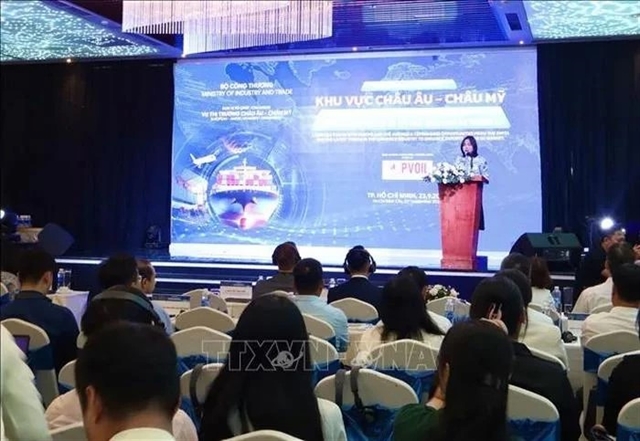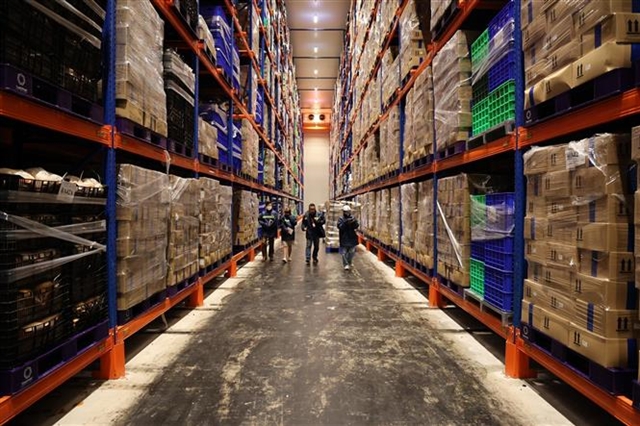 Economy
Economy

 |
| A conference was held in HCM City on October 15 to discuss green logistics. Many businesses are encountering difficulties in green transformation. - VNA Photo |
HCM CITY — While the green transformation of the logistics industry is important for reducing emissions, businesses are facing many difficulties, particularly a lack of capital, experts said.
A conference was held in HCM City on Tuesday afternoon to discuss the role of green logistics in sustainable green development towards net-zero by 2050.
Nguyễn Việt Dũng, director of the Centre for Natural Resources and Environment Communication under the Ministry of Natural Resources and Environment, said that green logistics is logistics activities (transportation, storage of materials, inventory management, packaging, etc.) that strive towards sustainable goals, environmental protection, and limiting negative impacts on the environment.
Trần Văn Toản, country head (Việt Nam) of Kosher Climate India, said that more and more countries and territories are demanding emission reports on production, transportation and business activities, and as Việt Nam is integrating into global commerce, companies need to adhere to green supply chain criteria to avoid being left behind.
At the start of 2024, the European Union Emissions Trading System (a carbon emission trading scheme to lower greenhouse gas emissions) began covering emissions from ships of 5,000 gross tonnage and above.
Meanwhile, the International Maritime Organisation's 2023 Greenhouse Gas Strategy is striving towards reducing emissions for international shipping by at least 40 per cent by 2030 compared to 2008, and this organisation is also planning to introduce carbon pricing for maritime transport.
Lương Quang Huy, head of the greenhouse gas reduction and ozone layer protection division under the ministry’s Climate Change Department, said that domestic traffic accounts for nearly 50 per cent of greenhouse gas emissions in logistics, so green transformation of traffic will play a big role in pursuing green logistics.
However, encouraging people to switch to public transportation and green vehicles is not easy due to the lack of viable options. For transportation and shipping businesses, changing to green vehicles will require a massive amount of investment, but supportive financial policies are limited.
 |
| Tân Cảng – Cát Lái Port in HCM City. Green transformation of the logistics industry will help reduce gas emissions, experts said. — Photo vlr.vn |
Nguyễn Việt Dũng said that Việt Nam currently has over 40,000 logistics businesses, the highest number compared to other ASEAN countries. However, they are working in a scattered manner and not connected with each other, especially those in road transportation, which is a big challenge when pursuing green transformation and satisfying international customers.
Bùi Văn Quỳ, deputy director of Saigon New Port Corporation, said that the company’s ports are pursuing green transformation by switching to loading, unloading and transshipment vehicles that use electricity and solar power as opposed to fossil fuel, as well as using high-tech to increase operational efficiency.
However, green transformation activities at seaports are not enough – the entire ecosystem needs to be “greenified” in a coordinated manner, from production and transportation to the end consumer.
A major barrier to green transformation is the high investment cost of new technology, as well as getting workers to adapt to them.
"To speed up the progress of green transformation, business leaders must clearly realise that green transformation is a matter of survival and must be done immediately," he said.
He also noted that different industries do not have a specific government-assigned road map and criteria for green transformation.
Đặng Đình Long, director of logistics company Mega A Trading Investment JSC, said that Việt Nam’s free trade agreements have caused a shift in supply chains, expanding export markets and facilitating the growth of Việt Nam’s logistics industry.
Vietnamese businesses partaking in international logistics markets have also realised the pressure of green transformation through environmental taxes and fuel surcharges.
He said that there is a lack of green capital to serve green transformation and skilled manpower for operating new technologies, so many businesses want related agencies to provide assistance in these regards.
Agencies should also launch a set of green criteria specific to each industry for businesses to follow. VNS




